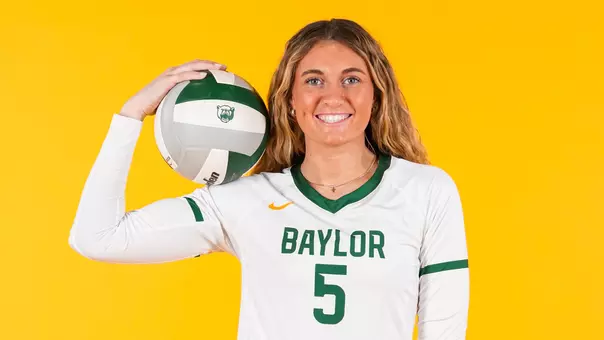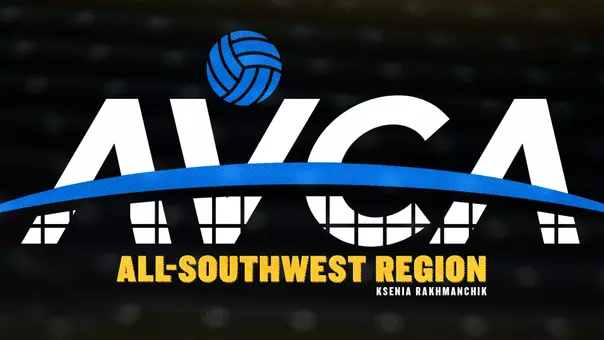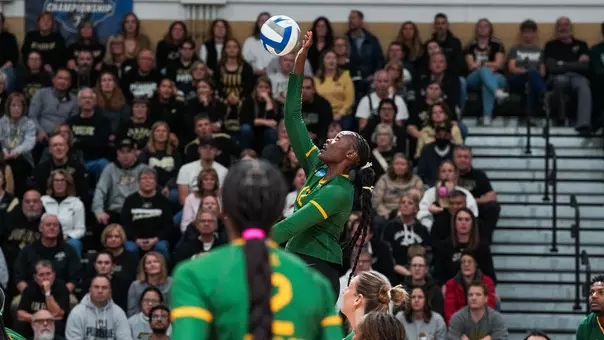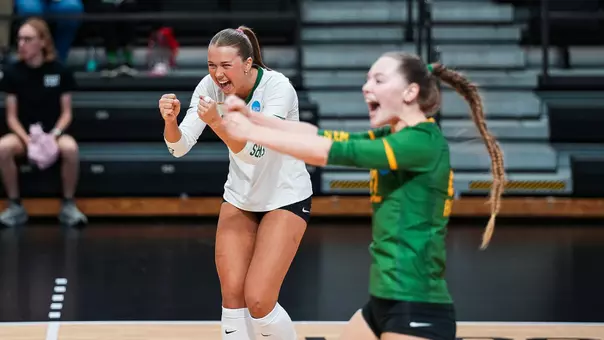
THE LEGACY OF MOLLY
12/16/2020 11:52:00 AM | Volleyball
Goal of Martinsen Challenge is to Name All 22 Volleyball Lockers
 By Jerry Hill
By Jerry HillBaylor Bear Insider
In her 11 ½ years on this earth, Molly Grace Martinsen impacted the lives of everyone she knew, others who happened to cross her path and some who just heard about this amazing athlete and her courageous battle.
Diagnosed with brain cancer when she was 10 years old, Molly fought with everything she had for the next year and desperately wanted to get back on the volleyball court. But, she passed away on May 10, 2012, leaving behind a legacy of faith, love, strength and courage beyond measure.
Her legacy is the driving force behind the Molly Martinsen Challenge, to permanently name each of the 22 lockers in Baylor Volleyball's recently completed Molly Martinsen Locker Room at the Ferrell Center.
Proceeds from the campaign will benefit the One Way Club, Baylor Volleyball's excellence fund, with a $7,500 donation (or $1,500 per year over five years) giving permanent naming rights for one of the 22 lockers. The goal is to raise $165,000 by the NCAA Volleyball Division I Final Four in late April 2021.
Former Baylor volleyball coach Mitch Casteel and his wife, Beth (Fountain) Casteel, gave the lead gift to name the locker room in Molly's memory. Beth was a teammate of Molly's mom, Jennifer (Putty) Martinsen, on the 1985 Baylor volleyball team.
"The pain of losing a child is something that I don't think any of us ever want to experience," said Mitch, a longtime volleyball coach who was at Baylor from 1983-88. "Having this memorialize her in a way that can help those other kids, we think, is just a wonderful way to do it, as well as benefit the Baylor Volleyball program.
"Hopefully, this spurs other people to make donations that they can use to help enhance the program, because it's a program that (head coach Ryan McGuyre) has shown can be in the Final Four and win national championships and do it with a lot of class."
Nick Florence, Baylor Associate AD for Major Gifts, said the Molly Martinsen Challenge "is an opportunity for us to capitalize on the generosity of the Casteels, the courageous story of Molly Martinsen and the success of Baylor Volleyball over the last few years."
McGuyre, who led the Bears to a 29-2 record, the program's first Big 12 championship and the Final Four in 2019, said the new locker room finally gives the team a home.
"Baylor is family, Baylor Volleyball is family, and now Baylor volleyball has a home," McGuyre said. "Home is where relationships continue to grow. Home is where you have nutrition and food and you eat healthy things. Home is a place where we can do film, but also our devotions and Bible studies, where you can have healthy spiritual food.
"And then, we talk about this all the time, but home is where the joy can be multiplied – we can add trophies to the trophy case – and where burdens are divided, where we can have a refuge from the stress of class and studies and finals. And be in a place where our prayer requests can be lifted up."
Dan Martinsen, Molly's dad, called the Casteels' donation and naming of the locker room in Molly's memory "a tremendous gift that they gave us to remember Molly in perpetuity at Baylor, a place where her mom played volleyball and that she loved to go there. We feel very humbled by it."
Jennifer Martinsen, a 1985-87 Baylor Volleyball letterwinner, said she hopes the locker room and the Molly Martinsen Challenge can be a "legacy for what she embodied, a legacy of faith more than anything, because I know she loved Jesus. And just the courage and strength. I want them to know that while this is important, this is not the big stuff – whether we win or lose – but what are we leaving?"
REMEMBERING MOLLY
Showing natural athletic ability at an early age, when Molly started going to the golf driving range with her older brother, Ben, when she was 5 years old, people would stop what they were doing just to check out her perfect swing.
"Golf pros would tell us, 'Don't ever let anyone change her swing,''' Jennifer said. "No matter what she did, if it was gymnastics, we would go one time and they would move us up two or three levels. We'd go to swim tryouts, and we would move up two or three levels. It was just a natural ability, but she loved it. She loved to compete."
Competing in a select volleyball tournament in Austin when she was 8, playing up with the 10-year-olds, Molly served at the start of a set and served for 25 consecutive points.
"At one point, Van Davis, who was her coach, said to Molly, 'Hey, let's go ahead and serve underhanded,''' Jennifer said. "Molly looked at Van and said, 'My mom never taught me that.' And the reason I didn't teach her how to serve underhand is because she was just so strong and started serving overhand."

When she was in the second grade, Molly wrote in an essay that her goals were to play volleyball at Baylor and then make the USA Olympics team. "I know I have to work for it, but that's what I want to do," she wrote.
Mitch, who first saw Molly play when she was 9 years old, said it's hard to project at that age just how good a player is going to be. "But, she was two or three steps ahead of everything," he said.
"You rarely see that in a kid. And when you do, it's so special that it's hard not to notice. Would she have played collegiately at some level? Without a doubt. Would she have played for Baylor? Who knows."
Before she got sick, Molly never missed a Baylor Volleyball home match and was sitting on the front row, taking everything in.
"You know how some kids would be playing something on their phone or talking to their friends," Jennifer said. "Not Molly, she was into it. I think she could have told (then-Baylor coach Jim Barnes) what to do and when to sub. At that young of an age, in the second, third and fourth grade, she was like, 'I don't know why we're not setting the middles,' or, "We're getting blocked on the outsides every time.'''
As the setter, even being the youngest player on the court by far, she was the quarterback of the team. "She's the one that used to tell Allye Beth (Deaton), 'Don't hit it straight, hit an angle,''' Dan said, referring to a Waco teammate that ended up playing collegiately at TCU.

One of her mom's favorite stories is when Molly's team was playing a select squad from Houston, and Molly started the match in the middle of the front row, opposite a 12-year-old who was 6-feet tall.
"Molly was maybe 4-8, 4-6, something like that," Jennifer said. "That girl looks down at Molly and says, 'You are SHORT!' Molly just looked up at her and said, 'Yep, but we're going to win.' And we did."
Even toward the very end, when Molly was paralyzed on the right side and had to wear an eyepatch after her brain surgery, she wouldn't quit or give an inch.
At Cook Children's Medical Center in Fort Worth, where she also went through her chemo treatments, Molly would tell her physical therapist, "Sugar Mama, I want to know what everyone else is doing in here, because I'm going to beat it by at least one."
"If anyone was going to beat it, grade-4 brain cancer, it was her," Jennifer said. "And she gave it her all."

As part of the visitation before Molly's funeral, children and adults alike were encouraged to use different colored Sharpies to write their names or a word to describe her on an all-white casket.
"She was our 64 Box of Crayons. She loved color, and she loved the different things about people's life," Jennifer said. "We had over 1,000 people there at the visitation. And for 6 ½ hours, they would write their names or draw a picture. And there was not a millimeter of white left on the outside of that casket."
One girl stopped at the casket and stood over it, but never wrote a thing. When someone asked the girl why she didn't write anything, she said, "I didn't know Molly, I just played against her . . . twice."
After the second time, she said, Molly had walked over to the girl's bench and tapped her on the shoulder.

Molly's message, after beating the girl in both matches, was: "I just wanted to let you know that I think you have improved so much since the last time we played. I also want you to know that I think you're a real leader on this court, and that your team watches you. So, when you shank a ball, don't worry about it, just pull it back together. And you're also an encourager. I just wanted you to know that."
The 11-year-old girl said, "When I heard Molly died, I told my mom I wanted to come to the funeral, because nobody had ever told me anything like that." She said, "Everybody else wanted to play like Molly, I wanted to be like Molly."
More than a year after Molly's passing, when Jennifer was speaking for the first time publicly about her death for a summer semester class at Baylor, a young man approached her after the class and said he was moved by Molly's story. He had never been to a cemetery, was actually scared of them, but he wanted to go with Jennifer to see Molly.
Lache Seastrunk, a junior running back on the Baylor football team in 2013, visited Molly's gravesite that summer day.
"That young man got on his knees, and I had to leave, because it was such a personal moment, him just talking to her," Jennifer said. "He calls me Mom now, but when he was done, he said, 'Mrs. Martinsen, what you're carrying with this grief, Molly doesn't want this for you.'''
Writing "MOLLY" on his wristbands before every game, Seastrunk dedicated that 2013 season to her memory, earning first-team All-Big 12 honors and helping the Bears win the first of back-to-back Big 12 championships.

"That was incredible for us," Jennifer said.
Now, eight years after Molly died, the generosity and love of Jennifer's former Baylor volleyball coach and teammate is rekindling those memories and helping her legacy live on.
"We didn't get a chance to really know her and spend a lot of time with her," Beth said, "but even through that experience, she's taught us all what it means to put Jesus first and to live a selfless life.
"Molly will never be able to suit up and represent us on the court. But, through this way, she will forever be present in our locker room and can provide a source of inspiration and be an example to all athletes that represent us going forward."

DONATION INFORMATION
If you need more information on the Molly Martinsen Challenge, you can contact Donovan Burriss, Director of Resource Development, at Donovan_Burriss@Baylor.edu or 254-447-5788.
Or, if you are ready to make a donation and permanently name a locker, you can go to the giving link at Molly Martinsen Challenge.
Would go to battle with this crew anytime 🫶
Monday, December 08
Hearts stopped. Records fell. Bears won!
Monday, December 08
Elevate ⬆️ and celebrate 🎉
Monday, December 08
💼 Workin' our way to match day
Monday, December 08



















